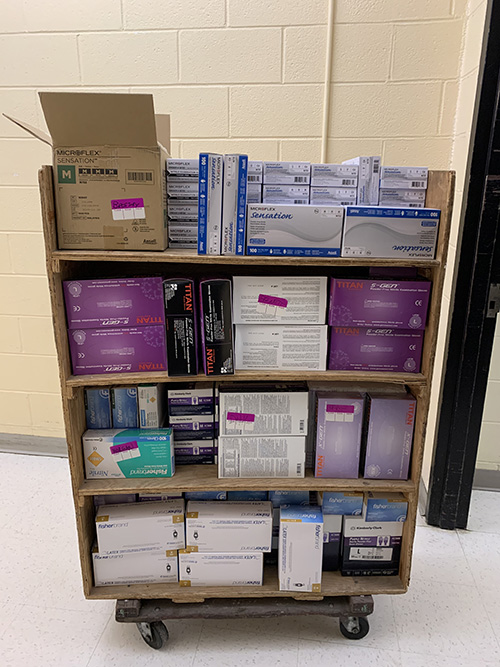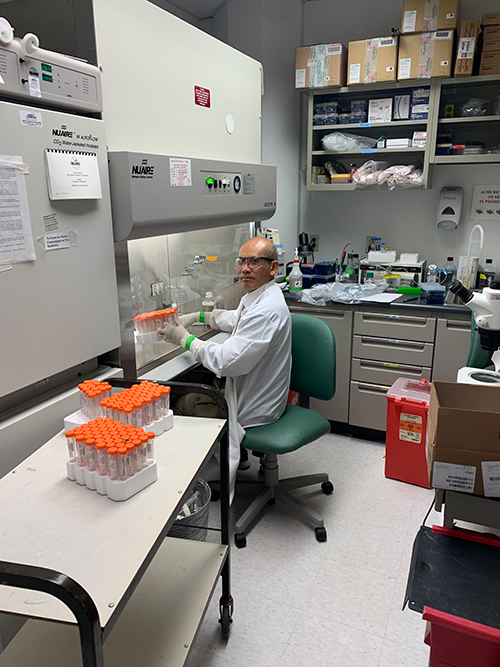PROVIDENCE R.I. [Brown University] — Facing the same acute shortage of personal protective equipment (PPE) and other supplies affecting health care providers across the nation, the Rhode Island Department of Health (RIDOH) and health organizations on the frontlines of the COVID-19 pandemic have issued urgent calls for donations.
At the forefront of that #GetMePPE effort are Brown physician scholars including (to name just two) Dr. Megan Ranney, an emergency physician and Warren Alpert Medical School faculty members, and Dr. Ashish Jha, incoming dean of Brown’s School of Public Health.
Now, thanks to a campus-wide effort to locate useful items, the Brown community is helping to answer the call.
Over the course of last week, Brown faculty and staff have gathered more than 4,000 critical N95 respirator face masks along with supplies of gloves, gowns, face shields and other items for donation to RIDOH as well as the Lifespan and Care New England hospital systems. And a Brown biomedical lab is producing and donating a component critical in testing for novel coronavirus infections, which will be important slowing the spread of the virus.
The supplies were sourced from Brown’s Environmental Health and Safety (EHS) office as well as laboratories in the Division of Biology and Medicine, chemistry, engineering, physics and even the Brown University Library, where masks are used in work to preserve archives and other historical materials.
To date, Rhode Island has confirmed 488 cases of COVID-19. That number continues to grow daily and with it the need for supplies to help keep health care professionals safe.
“Health care professionals here in Rhode Island and across the country are doing heroic work in caring for COVID-19 patients," said Dr. Jack A. Elias, senior vice president for health affairs and dean of medicine and biological sciences at Brown. “We hope that these donations of much-needed testing supplies and personal protective equipment will play a role in helping to keep those frontline personnel safe during the days and weeks ahead. I am very proud of our faculty on the front lines and our faculty and staff for coming together to make this happen. We will continue to work with agencies and providers in the state to make sure we’re contributing wherever we can.”
Edward Hawrot, a professor of medical science and associate dean of biology who helped to organize the effort, said that the N95 masks address a particular need at this point in time.
“What we’ve been hearing the last few days is that N95 masks are a major need,” Hawrot said. “These are the masks that health care workers need to be wearing if they’re dealing with a virus, so I’m glad we were able to pitch in.”
Most of the 4,000 masks Brown donated came from a stock assembled by EHS as part of its routine emergency preparedness planning.
“One of the things we’ve planned for is a pandemic, and masks are a part of that,” said Stephen Morin, Brown’s EHS director. “It became obvious that we had masks to spare and our physicians need them urgently, so we looked into how to donate them. I'm happy that we’re able to play a role in helping physicians and hospitals in Rhode Island.”
In all, more than 30 laboratories and offices on campus came together to contribute supplies. EHS officer Stephanie Santucci and safety specialist Ernie Quackenbush oversaw the collection of items and managed a series of deliveries.
“My colleagues and I have been very concerned about the lack of medical supplies for health care workers, so we collected what we could,” said Gang Xiao, chair of the physics department, home to materials science lab that made masks, gloves, face shields and other items available for donation. “Every little bit helps and I'm glad we were able to assist, even in small ways, in this important effort.”
In a related effort, faculty from the chemistry department are making hand sanitizer. Faculty members Amit Basu, Eunsuk Kim and Matthew Zimmt have made and donated 9.5 gallons so far.
All of those donations are just one way in which the Brown community is working to help during the pandemic.

In a separate initiative on campus in the lab of Dr. Jonathan Kurtis, a professor of pathology and laboratory medicine, technicians have been hard at work mixing viral transport medium (VTM), a solution used in COVID-19 testing that has been in critical short supply. It’s the solution that swabs are placed into after a sample is taken for testing. As of today, the lab has mixed enough VTM for 2,100 COVID-19 tests and distributed them to local health care providers and RIDOH. The lab plans to donate enough for enough for an additional 5,000 tests to be delivered in the coming days.
Laboratory manager Sunthorn Pond-Tor, along with colleagues Dr. Hannah Wu, Danielle Mancini and Andrew James, did much of the painstaking work of filling, sealing and labeling each VTM vial. Pond-Tor, a Cambodian immigrant who came to the United States as a child fleeing the brutal Khmer Rouge regime, said he was proud to be able to help in a time of need.
“When Dr. Kurtis asked me if I was willing to help make viral transport media for COVID-19 I asked, ‘when can I start?’” Pond-Tor said. “The United States of America has been my home and has given me the opportunity to achieve my dreams. If there is any way I am able to help in giving back to this country that has helped me, I will do it in any way that I can.”
Hawrot said that Brown faculty and staff will continue to look for ways to help in the effort to fight novel coronavirus and assist clinicians on the frontlines.
Third- and fourth-year medical students whose clinical rotations are paused have been offering direct assistance to health care providers and agencies, and Hawrot and Kurtis have now convened, in coordination with Office of the Vice President for Research at Brown, a COVID research task force aimed at bringing Brown expertise from across campus to bear on the epidemic.
“We would like to get input from people who have research ideas related to COVID, with a priority on those ideas that would lead to an immediate impact in the current crisis,” Hawrot said. “We’re looking for ideas that might help in treating the disease, and we hope to facilitate new research collaborations that could lead to an actionable understanding of the mechanisms underlying this disease, or that may help in developing a vaccine.”
Morin said that he and his staff also are looking for ways to continue pitching in.
“I’ve encouraged my staff to think about what else we could be doing at Brown and beyond,” he said. “Everyone wants to help, and you can see that here on campus as well as around the state and around the country.”